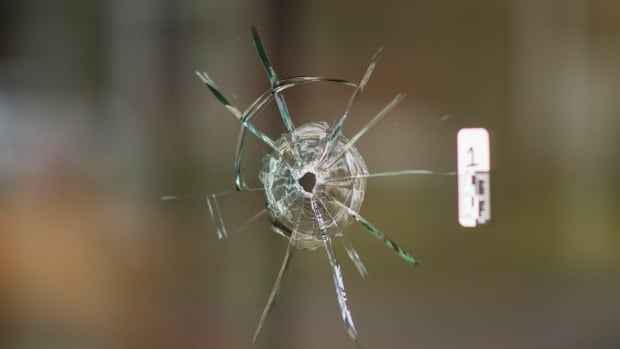Gun violence is on the rise in Canada. In parts of the Greater Toronto Area, it’s a record-breaking year
Melanie Ward remembers the moment she learned her son was dead with haunting clarity.
“I just dropped to my knees and screamed,” she said.
Her son, Alexander Circiumaru, was on his way to an appointment in downtown Hamilton earlier this year but never made it.
The 19-year-old was shot multiple times in broad daylight on March 6 in what Hamilton police believe was a targeted attack. Circiumaru was rushed to hospital, where he was pronounced dead.
Ward, who lives near Naples, Fla., said she’s been picking up the pieces of her life ever since.
“I lost my son. I lost the teenager. I lost the 19 years of his life and now I lose his future.”
Ward is one of many family members grappling with the consequences of growing gun violence in Hamilton and across the Greater Toronto Area (GTA) this year. Several of the region’s police forces have warned of an alarming rise in shootings since January.
The rise in gun violence in the GTA also reflects a larger trend that’s taking place across Canada.
Record-breaking year so far
In Hamilton, there have been 58 shootings as of Nov. 4, compared to 35 for all of last year — a record for the city, according to Staff Sgt. Steve Bereziuk.
He leads the Hamilton Police Service’s shooting response team, one of the few police units of its kind in Canada, recently formed to address the rise in gun violence there.
“These shootings are occurring specifically at all hours of the day but what we’re starting to see is a trend of daytime shootings and not just daytime shootings, but shootouts between individuals and involving more than one firearm,” Bereziuk said.

He said there have been several notably disturbing incidents in the last year, including one daytime shooting in August in the city’s east end where someone was used a human shield. In another incident, a man was shot after letting a six-year-old play with his gun.
“We’re concerned. That is no secret. These are scary numbers,” Bereziuk said.
Peel Regional Police officers are, on average, seizing an illegal firearm every 36 hours, “leading to more gun violence than we’ve ever seen,” Chief Nishan Duraiappah said in a video update posted last month.
Between January to September last year, he said Peel police seized 84 illegal firearms. During the same time period in 2024, there have been 157 illegal guns seized — an 86 per cent increase.
York and Toronto are seeing similar increases.
In Toronto, there have been 126 more shootings so far this year compared to the same period last year, according to the police data portal. With a total of 395 incidents since January, it also marks the most shootings the city has seen in four years.
York is also seeing a four-year high, according to numbers provided by its police force, with 63 shootings as of the end of October this year.
WATCH | Peel Regional Police describe the ongoing gun violence in that area:
More illegal firearms available
Marty Kearns, deputy commissioner of the Ontario Provincial Police, acknowledged a rise in violent crime across the province during a news conference last week.
“We’re finding guns are involved in more and more crimes, more, in particular, violent crimes,” he said.
According to the most recent data from Statistics Canada, the number of shootings across the country more than doubled between 2018 and 2023, rising from 1,151 incidents to 2,323.
Gun violence experts say it’s not necessarily surprising and the reason why is likely because of our neighbours to the south.
“The guns overwhelmingly are coming from the United States,” said Jooyoung Lee, a professor of sociology at the University of Toronto.
“The U.S. is the global exporter of crime guns. It has crime guns flowing into Canada, into Mexico, abroad into Asia, Europe, you name it.”
He said that’s because of “porous gun laws there,” making it easier for anyone to get their hands on firearms, and while Canada has no control over that, it could do more to secure its borders.
In a statement to CBC, the Canada Border Services Agency said it’s intercepted 887 firearms as of Oct. 15 this year and that it works with police partners to stem the flow of guns into Canada.
“Smugglers are increasingly utilizing more sophisticated concealment methods in smuggling attempts,” it said.
CBSA officials said that’s why there are dedicated teams and resources to detect prohibited materials like firearms. That includes handheld devices, X-ray machines, and detector dogs.
Earlier this year, the agency also appointed an executive director for combatting firearms smuggling, who is supposed to help lead efforts against illegal firearms smuggling.
Bereziuk confirmed the majority of illegal firearms seized by Hamilton police are traced back to the States.
“That’s something that the local police department has no control over and that’s not something that we can enforce,” he said.
It’s precisely why the Canadian federal government’s 2022 “freeze” on the sale, purchase and transfers of handguns has done little to combat the spike in crime here, said Lee.
What policy makers should pay attention to, he said, is not only tightening border security but also the socioeconomic disparities in the country.
“We know from just generations of gun violence research that the most marginalized, the most distressed places in cities and towns are always the hotspots for violence,” he said. Vulnerable people are more likely to be exposed to gun violence, to know someone who’s been victimized and to know someone who might get involved in crime to make ends meet.
Ward said until something changes, it’s families like hers that are left to deal with the devastating consequences.
“[Alex] was just beginning his life … a future ahead of them and it was just robbed of him. It was robbed of me and my family.”


